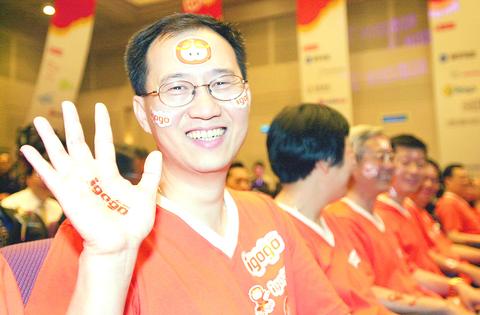Local mobile phone operator, KG Telecommunications Co Ltd (
"We will bring a successful mobile data communication platform from NTT DoCoMo to Taiwan in the middle of next year, providing entertainment and interactive information via handsets," said Leslie Koo (
NTT DoCoMo Inc is the largest mobile phone operator in Japan, and its i-mode service has more than 24 million users.

PHOTO: GEORGE TSORNG, TAIPEI TIMES
DoCoMo took two seats on KG Telecom's board after buying a 20 percent stake in the firm for NT$17.1 billion at the end of 2000. Then in June of this year, DoCoMo injected another NT$1.87 billion to raise its share to 21.4 percent.
Taking advantage of this relationship, KG Telecom will import and customize an "i-mode like" service for Taiwan, according to the company.
"DoCoMo offers us experience and knowledge in managing mobile Web sites, developing business models, and consulting on technology," said Roger Chen (
KG Telecom has aligned with 160 content providers in Taiwan and employed the same business model as DoCoMo, Chen said.
That model involves a basic monthly usage fee for the customized package of content users choose, plus actual air-time fees.
According to KG Telecom, 91 percent of the monthly content subscription fees go to content providers, with the majority of profits expected to come from air- time fees.
However, one content provider said that the method of calculation does little to add subscribers.
"If our commissions can be extracted from the air-time rather than from the subscription fees, we can attract more subscribers," said Sarah Yeh (
The company has cooperated with Taiwan Cellular Corp (
The key is to standardize screen sizes, Koo said.
"The main reason behind i-mode's attractive content is its standardized screen size, which enables content providers to design content to exactly match the screen," Koo said.
Koo said the company would launch its "`i-mode like' handsets together with phone service."
He refused to elaborate on which handset manufacturers would cooperate with the plan.
One telecom pundit said that the success of the service will depend on market positioning.
"DoCoMo popularized the service largely because of its market dominance," said Alex Wu (
"The service can help content providers make money -- breaking the myth of free Internet usage," Wu said.
Another industry watcher said at least two major sources of content are necessary for the service to become popular. "Entertainment material draws teenagers, and heavy users, such as businesspeople, want information," said Nathan Lin (林宗賢), a telecom analyst at National Securities Corp (建宏證券).

Meta Platforms Inc offered US$100 million bonuses to OpenAI employees in an unsuccessful bid to poach the ChatGPT maker’s talent and strengthen its own generative artificial intelligence (AI) teams, OpenAI CEO Sam Altman has said. Facebook’s parent company — a competitor of OpenAI — also offered “giant” annual salaries exceeding US$100 million to OpenAI staffers, Altman said in an interview on the Uncapped with Jack Altman podcast released on Tuesday. “It is crazy,” Sam Altman told his brother Jack in the interview. “I’m really happy that at least so far none of our best people have decided to take them

BYPASSING CHINA TARIFFS: In the first five months of this year, Foxconn sent US$4.4bn of iPhones to the US from India, compared with US$3.7bn in the whole of last year Nearly all the iPhones exported by Foxconn Technology Group (富士康科技集團) from India went to the US between March and last month, customs data showed, far above last year’s average of 50 percent and a clear sign of Apple Inc’s efforts to bypass high US tariffs imposed on China. The numbers, being reported by Reuters for the first time, show that Apple has realigned its India exports to almost exclusively serve the US market, when previously the devices were more widely distributed to nations including the Netherlands and the Czech Republic. During March to last month, Foxconn, known as Hon Hai Precision Industry

PLANS: MSI is also planning to upgrade its service center in the Netherlands Micro-Star International Co (MSI, 微星) yesterday said it plans to set up a server assembly line at its Poland service center this year at the earliest. The computer and peripherals manufacturer expects that the new server assembly line would shorten transportation times in shipments to European countries, a company spokesperson told the Taipei Times by telephone. MSI manufactures motherboards, graphics cards, notebook computers, servers, optical storage devices and communication devices. The company operates plants in Taiwan and China, and runs a global network of service centers. The company is also considering upgrading its service center in the Netherlands into a

Taiwan’s property market is entering a freeze, with mortgage activity across the nation’s six largest cities plummeting in the first quarter, H&B Realty Co (住商不動產) said yesterday, citing mounting pressure on housing demand amid tighter lending rules and regulatory curbs. Mortgage applications in Taipei, New Taipei City, Taoyuan, Taichung, Tainan and Kaohsiung totaled 28,078 from January to March, a sharp 36.3 percent decline from 44,082 in the same period last year, the nation’s largest real-estate brokerage by franchise said, citing data from the Joint Credit Information Center (JCIC, 聯徵中心). “The simultaneous decline across all six cities reflects just how drastically the market